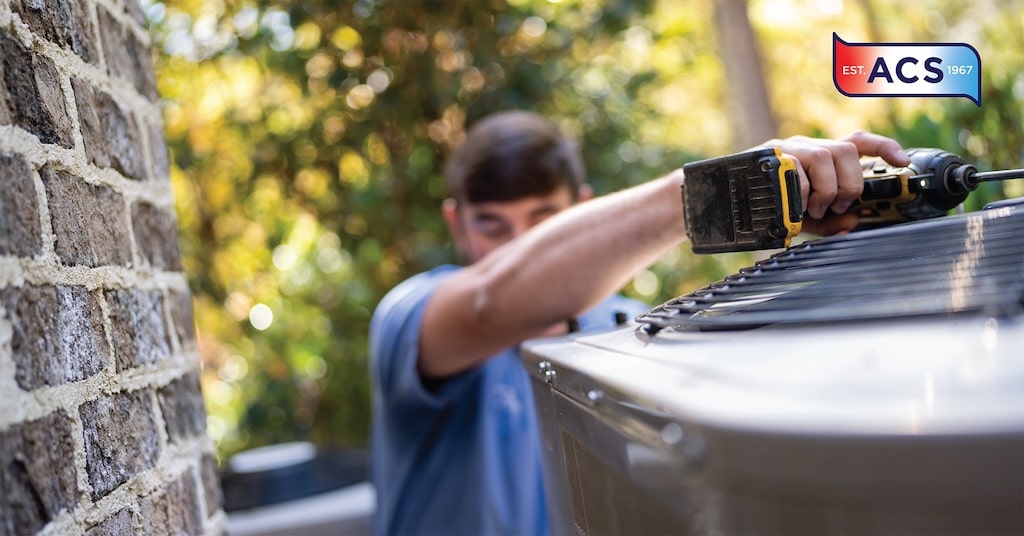When it comes to heating your home, you’ve got a couple of options: heat pumps and furnaces. Both can keep you cozy when it’s chilly outside, but you need to think about what’s right for you. It all depends on your situation, so one might work better than the other.
At ACS, we offer high-quality heating services and exclusive industry insight to help you choose the best-fit heating solution for your home. Our HVAC-certified technicians offer premium installation, repairs, and system replacements for all models of heating equipment. If you’re thinking about how to heat your home, we’re here to help. We’ve got a really helpful comparison of heat pumps and furnaces to help you decide what’s right for you.
What is a Heat Pump?
A heat pump is a component of a central heating and cooling system that acts as an energy-efficiency alternative to a furnace and air conditioner. Offering versatility and flexibility, a heat pump uses outside air to heat your home in winter and cool it in the summer. The distinctive part about heat pumps is that they don’t generate heat – they relocate it. In the cooler months, a heat pump draws warm air from the outside and transfers it inside your home. A heat pump will reverse this process during the summer, pumping out warm air from inside your house through its outdoor unit.
If you choose a heat pump over a furnace, the decision-making doesn’t stop there. Heat pumps come in several different xxmodels, some of which may be a better fit for you than others. If you’re prioritizing cost, consider an air source heat pump, as this popular option can cut electricity use in half. But if you’re seeking climate adaptability, a geothermal heat pump might be your best choice.
What is a Furnace?
A furnace is a component of a central HVAC system that converts fuel into heat and circulates it throughout a home. Like heat pumps, furnaces come in different models: gas and electric. For gas furnaces, thermostat adjustment triggers the system’s pilot light and ignites its heat exchanger’s main burner. The heat exchanger draws energy from the main burner to create heat and uses a blower fan to distribute heat throughout your space. An electric furnace will follow this same process, except with an electrical ignition system.
Which System is Right for Me?
Heat pumps and furnaces both have their fair share of pros and cons. However, evaluating your circumstances and needs is the best way to weigh your options. In doing so, you might ask yourself: What kind of climate do I live in? How much space do I have for a unit? How much am I willing to spend?
At ACS, we recommend evaluating the following factors when deciding between a furnace or a heat pump:
Cost
As a homeowner, you want to ensure your heating installation is budget-friendly. However, it’s also important to account for operating and maintenance costs. Generally, heat pumps have lower operating and installation costs. However, heat pumps may require more maintenance. Typically, furnaces only require filter changes and vacuuming, as they don’t have coils or compressors to monitor and maintain.
Size
If you’re limited in space, a heat pump may be right for you. When mounted outside, a heat pump’s outdoor unit only requires two feet of clearance around it, and its indoor unit requires even less! However, depending on the model, a furnace could need more surface area around it. If your furnace doesn’t have enough room, gas fumes and toxic carbon monoxide could build up around your unit and flow into your home.
Performance
Your heating system’s performance will depend on where you live. Because heat pumps transfer heat indoors and outdoors, they perform best in moderate climates. The colder temperatures get, the more difficult it will be for a heat pump to transfer heat. Meanwhile, a furnace generates heat and will have no problem heating your home in below-freezing temperatures.
Energy Usage
One of the top reasons to install a heat pump is its energy efficiency. A heat pump’s energy transfer uses much less energy than a furnace’s generative method. However, a furnace may take the lead in consistently cold climates, as a heat pump will have to work harder to warm your home in cooler temperatures.
Expected Lifespan
When properly maintained, a heat pump will have a lifespan of about 15 years. However, a well-maintenance gas or electric furnace could last 20 years or more. If you’re not planning on leaving your home anytime soon, you might opt for a furnace that you can keep for the long haul.
HVAC Heating and Cooling with ACS
At ACS, we are committed to helping you get the most out of your heating and cooling systems. Whether installing a heat pump or a furnace, no heating job is too big or too small for our team of top-performing HVAC technicians. If you’re looking for premier heating services in Covington, Milledgeville and surrounding areas, connect with our team today!



